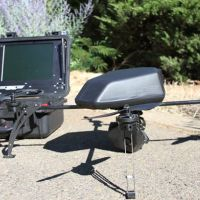Berkeley City Council Declares No-Drone Zone for One Year
 AirCover QR425 drone
AirCover QR425 drone
Taking note that the Alameda County Sheriff bought a couple of drones on his own after the County Board of Supervisors rebuffed the idea, the Berkeley City Council voted to prohibit their police department from buying or borrowing one for a year.
The 7-1 vote, with one abstention, still allows the fire department to use drones for disaster response. The council rejected a recommendation by the Peace and Justice Commission, which has been pushing for a no-drone zone since 2012, for a two-year moratorium.
In its report (pdf) to the city council in April 2014, the commission warned that drones weren’t safe, their usability was limited, their surveillance capability presented a “slippery slope” toward “mission creep” that would threaten civil liberties, and they imperiled the constitutional right of privacy.
The report noted “the clear potential to violate the Fourth Amendment on a massive scale.” Buying drones was not “on a par with giving Segways to mall officers.”
The National Conference for State Legislatures (NCSL) reported that 35 states were considering restrictions on drones as of September 2014 and 10 had enacted such laws.USA Today said that number was now 15.
Fourteen of those states included curbs on government monitoring of citizens at public rallies, in traffic or other places. Seven restricted private use that monitors people or property without permission.
California lawmakers took a run at crafting drone legislation last year when they passed Assembly Bill 1327. The bill required law enforcement agencies to get a warrant before using a drone except under certain circumstances. Those included “an imminent threat to life or of great bodily harm,” which might be a fire, a hostage crisis, a hot pursuit, a search and rescue operation or any operation where law enforcement personnel are in danger.
Some civil libertarians worried that it might be too broad and could, for instance, open the door to weaponization. Governor Jerry Brown thought it was too restrictive and vetoed it last September.
Drones are big business. The Teal Group predicted that the drone market worldwide will top $91 billion over the next 10 years. Drones are “the most dynamic growth sector of the world aerospace industry this decade.” Right now, the military accounts for 89% of the market, but the Teal Group predicted that would drop slightly to 86% in 10 years.
U-T San Diego says California lawmakers are working on three new bills to deal with drones. Assembly Bills 37 and 56 are similar to the bill Brown vetoed. Both limit police use of drones and may be combined at some point.
The third one is different. Assemblywoman Marie Waldron (R-Escondido) told the newspaper her legislation, Assembly Bill 14, is not a “regulation bill” because, “Something new comes out and everybody tries to regulate it.” AB14 creates a task force to study the industry’s needs and delays all action until January 2018.
–Ken Broder
To Learn More:
Berkeley Council Passes One-Year Moratorium on Police Drones (by Tom Lochner, Bay Area News Group)
Crackdown on Drones Goes Local (by Kaja Whitehouse, USAToday)
Drone Battle to Come Before Berkeley City Council (by Emilie Raguso, Berkeleyside)
California Eyes Rules for Drones (by Chris Nichols, U-T San Diego)
Teal Group Predicts Worldwide UAV Market Will Total $91 Billion in Its 2014 UAV Market Profile and Forecast (Teal Group Corporation)
Rebuffed Alameda County Sheriff Buys Two Drones Anyway (by Ken Broder, AllGov California)
- Top Stories
- Controversies
- Where is the Money Going?
- California and the Nation
- Appointments and Resignations
- Unusual News
- Latest News
- California Forbids U.S. Immigration Agents from Pretending to be Police
- California Lawmakers Urged to Strip “Self-Dealing” Tax Board of Its Duties
- Big Oil’s Grip on California
- Santa Cruz Police See Homeland Security Betrayal in Use of Gang Roundup as Cover for Immigration Raid
- Oil Companies Face Deadline to Stop Polluting California Groundwater





